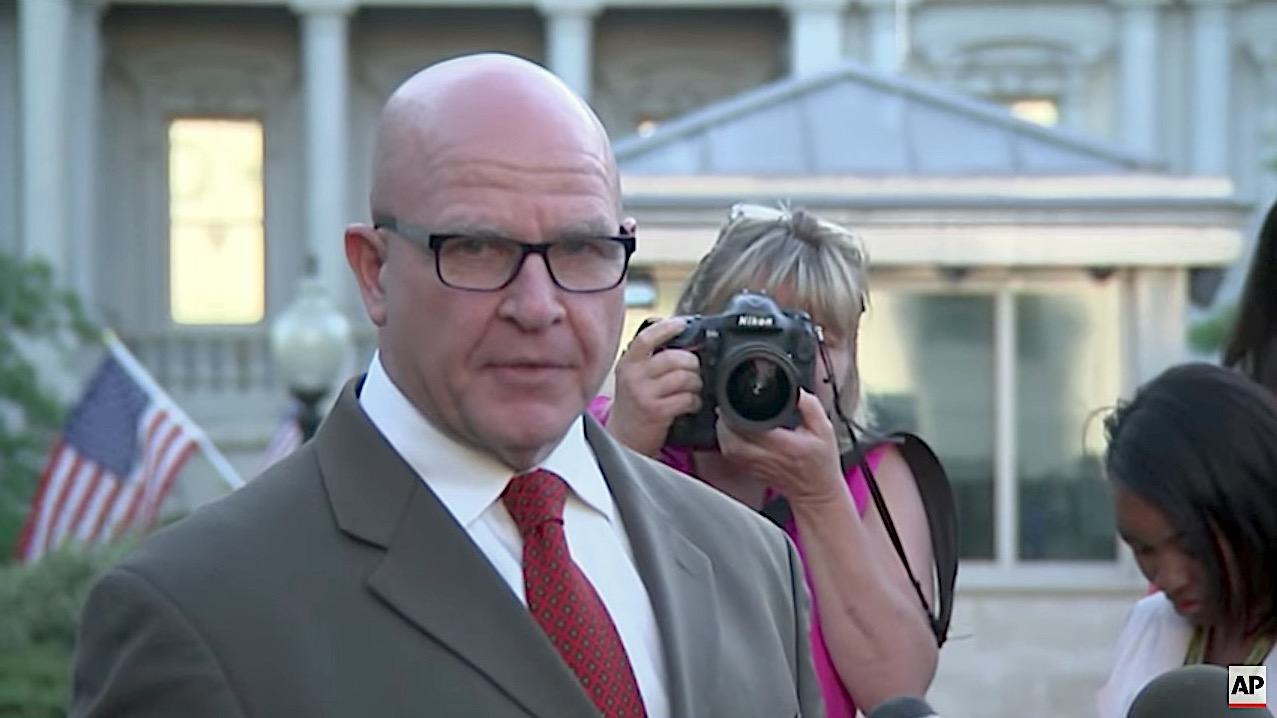What National Security Adviser McMaster did not deny about Trump sharing intelligence with Russia


A free daily email with the biggest news stories of the day – and the best features from TheWeek.com
You are now subscribed
Your newsletter sign-up was successful
The part the White House wants you to remember about National Security Adviser H.R. McMaster's statement, read at a hastily arranged press conference Monday evening, is his last line about The Washington Post's bombshell report that President Trump shared highly classified intelligence with Russian Foreign Minister Sergey Lavrov and Ambassador Sergey Kislyak in their already unusual Oval Office meeting: "I was in the room. It didn't happen." The carefully worded statement said the Washington Post article, "as reported, is false," but what he specifically denied is not what The Washington Post reported.
McMaster said Trump never discussed "intelligence sources or methods" with the Russian officials, and "did not disclose any military operations that were not already publicly known." But what the Post reported — confirmed by The New York Times, Reuters, CNN, and BuzzFeed, one of whose sources said Trump's disclosure is "far worse than what has already been reported" — is that Trump "jeopardized a critical source of intelligence on the Islamic State" by sharing details Russia could use "to help identify the U.S. ally or intelligence capability involved."
Importantly, "at no point in his statement to the Post before the story went live or in his appearance in front of reporters afterward does McMaster say, 'President Trump didn't share classified information with Russia' or anything close to it," says Aaron Blake at The Washington Post. A group of top national security lawyers at Lawfare make a similar point: that McMaster's "carefully worded" statement and another from Secretary of State Rex Tillerson "leave open the possibility that classified information was disclosed other than sources and methods or that classified information was disclosed which might be used as a basis to infer sources and methods not directly disclosed." They also explain why this matters:
The Week
Escape your echo chamber. Get the facts behind the news, plus analysis from multiple perspectives.

Sign up for The Week's Free Newsletters
From our morning news briefing to a weekly Good News Newsletter, get the best of The Week delivered directly to your inbox.
From our morning news briefing to a weekly Good News Newsletter, get the best of The Week delivered directly to your inbox.
It is important to recognize that not all top secret information is created equal. The most sensitive category by far is that related to the protection of "sources and methods," which relates not just to the substance of intelligence but to the manner by which it was obtained. If sources and methods information is revealed, it risks losing the method of collection in the future, which poses much larger long-term security consequences. [Lawfare]
The CNN report below indicates that intelligence sources differ slightly on the exact severity of Trump's disclosure to the Russians, but do agree it is a big deal. Peter Weber
A free daily email with the biggest news stories of the day – and the best features from TheWeek.com
Peter has worked as a news and culture writer and editor at The Week since the site's launch in 2008. He covers politics, world affairs, religion and cultural currents. His journalism career began as a copy editor at a financial newswire and has included editorial positions at The New York Times Magazine, Facts on File, and Oregon State University.
-
 The EU’s war on fast fashion
The EU’s war on fast fashionIn the Spotlight Bloc launches investigation into Shein over sale of weapons and ‘childlike’ sex dolls, alongside efforts to tax e-commerce giants and combat textile waste
-
 How to Get to Heaven from Belfast: a ‘highly entertaining ride’
How to Get to Heaven from Belfast: a ‘highly entertaining ride’The Week Recommends Mystery-comedy from the creator of Derry Girls should be ‘your new binge-watch’
-
 The 8 best TV shows of the 1960s
The 8 best TV shows of the 1960sThe standout shows of this decade take viewers from outer space to the Wild West
-
 Judge orders Washington slavery exhibit restored
Judge orders Washington slavery exhibit restoredSpeed Read The Trump administration took down displays about slavery at the President’s House Site in Philadelphia
-
 Hyatt chair joins growing list of Epstein files losers
Hyatt chair joins growing list of Epstein files losersSpeed Read Thomas Pritzker stepped down as executive chair of the Hyatt Hotels Corporation over his ties with Jeffrey Epstein and Ghislaine Maxwell
-
 Judge blocks Hegseth from punishing Kelly over video
Judge blocks Hegseth from punishing Kelly over videoSpeed Read Defense Secretary Pete Hegseth pushed for the senator to be demoted over a video in which he reminds military officials they should refuse illegal orders
-
 Trump’s EPA kills legal basis for federal climate policy
Trump’s EPA kills legal basis for federal climate policySpeed Read The government’s authority to regulate several planet-warming pollutants has been repealed
-
 House votes to end Trump’s Canada tariffs
House votes to end Trump’s Canada tariffsSpeed Read Six Republicans joined with Democrats to repeal the president’s tariffs
-
 Bondi, Democrats clash over Epstein in hearing
Bondi, Democrats clash over Epstein in hearingSpeed Read Attorney General Pam Bondi ignored survivors of convicted sex offender Jeffrey Epstein and demanded that Democrats apologize to Trump
-
 El Paso airspace closure tied to FAA-Pentagon standoff
El Paso airspace closure tied to FAA-Pentagon standoffSpeed Read The closure in the Texas border city stemmed from disagreements between the Federal Aviation Administration and Pentagon officials over drone-related tests
-
 Judge blocks Trump suit for Michigan voter rolls
Judge blocks Trump suit for Michigan voter rollsSpeed Read A Trump-appointed federal judge rejected the administration’s demand for voters’ personal data
